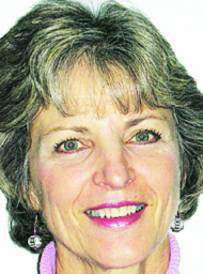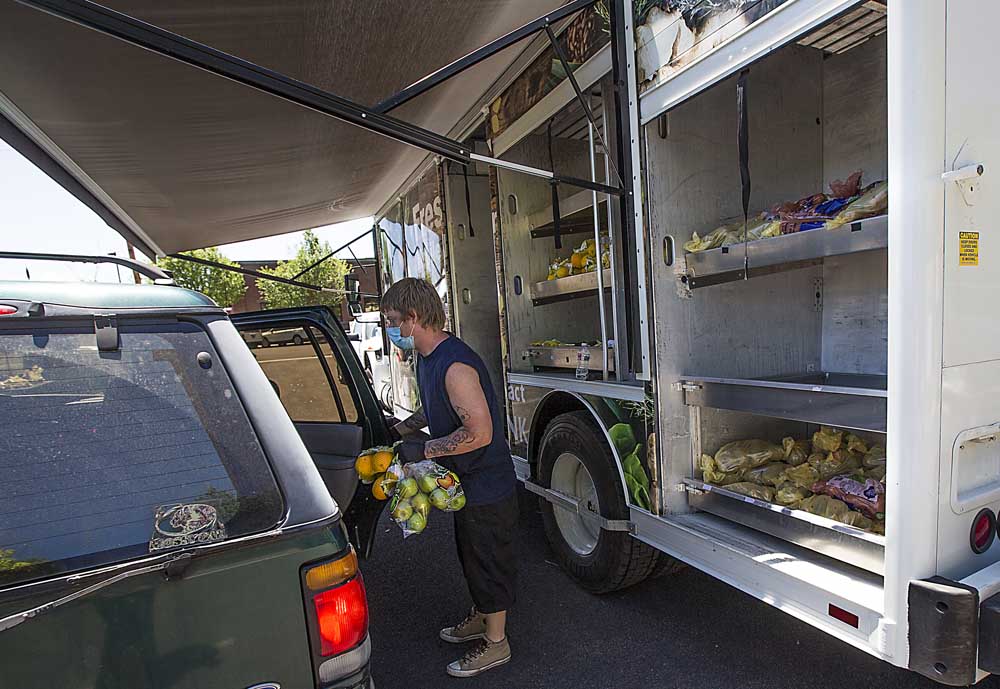A rocky tenure at EOU, but still on Oregon’s payroll
Published 4:00 am Sunday, January 13, 2008

- Dixie Lund, interim EOU president, said the universitys new strategy of which Fatemi had no part will lead to a stronger rural college.
SALEM — The pink slips are going out at Eastern Oregon University.
Officials this month released a “repositioning” plan that will pare staff, eliminate physics and German language programs, and consolidate departments in an attempt to save $4.1 million over three years and stabilize the finances at the La Grande-based college.
In all, the school will eliminate the equivalent of 18 full-time jobs.
Yet the man who state and campus officials say steered the campus into deeper financial trouble, former university President Khosrow Fatemi, remains on the university system payroll.
He now earns $192,000 as a special assistant to the state chancellor of higher education and is the second-highest paid employee in that office, behind only the chancellor. Fatemi works from the 8,253-square-foot house he built on 164 acres north of La Grande.
Fatemi, 63, resigned from the college’s top post in July after a controversial three-year run that included a faculty no-confidence vote and a level of spending that shrunk the school’s reserves from 14.4 percent to less than 3 percent of its annual revenue. The state says campuses should maintain reserves of at least 5 percent.
Ignoring state projections of faltering enrollment and resulting funding cuts, Fatemi hired new administrators, doled out additional scholarships and spent $65,000 to remodel a former fish biology lab into a new president’s suite.
In addition, he was perceived as aloof in the community and almost invisible on campus, according to interviews with students and staff.
“There was not a lot of transparency, but he kept spending all this money,” said Dan Mielke, a physical education and health professor and the chairman of the faculty senate, explaining the tension that led to the April 2006 no-confidence vote.
“People were concerned about the budget and the university, and concerned about losing their positions — which now has happened.”
The school is the easternmost of seven campuses in the state university system and one of two based on the dry side of the Cascades. The other is Oregon Institute of Technology in Klamath Falls.
The state opened a branch campus of Oregon State University in Bend in 2001.
EOU now serves about 3,400 students, coming from every county in Oregon. About half of those enrolled are physically on campus, and the others attend via online courses.
Fatemi now consults on rural university issues and federal legislation. His $192,000 salary matches the pay and housing allowance in the three-year contract at Eastern that ran from 2004 to 2007, university officials said.
Although he is the only chancellor’s office employee within 150 miles and specializing in rural college matters, Fatemi was given no role in helping to develop the repositioning plan for EOU.
He is working full time this academic year and will become a half-time employee — and earn $96,000 — for the 2008-09 year, which begins July 1, according to his resignation agreement dated July 12. His contract will end in June 2009.
‘Not the right fit’
Chancellor George Pernsteiner said keeping the former president on the state payroll could pay off for taxpayers — even though he acknowledges that Fatemi was not the right fit for Eastern. Still, he said there are no plans to renew the contract after it expires.
Fatemi is helping develop federal legislation that would steer additional money to rural colleges, much like the government does now for specialized schools that serve minorities, Pernsteiner said. If successful, such a program could be a life preserver for rural campuses across the nation, he said.
Pernsteiner said the position came out of months of conversations.
“We needed a change in leadership at that campus, and there was work that needed to be done with regard to our rural initiatives and to sell the value of rural universities to decision makers who are not from rural areas. It seemed like a reasonable match to me to have him do that.”
Pernsteiner said the biggest problem at EOU was its enrollment, which fell from 3,533 students in fall 2005 to 3,079 students in spring 2007.
The two-year contract at the chancellor’s office is not a “golden parachute” — a de facto severance deal, Pernsteiner said.
Yet state Sen. Vicki Walker, D-Eugene, isn’t so sure.
Alarmed about taxpayer-financed buyouts given to departing public school superintendents, Walker, chairwoman of the Senate Education Committee, pushed successful legislation in 2007 that banned golden parachutes for K-12 schools.
Universities and community colleges fought being included in the legislation — and were removed, she said.
“Now we see this,” she said. “I find it fascinating he is still working for $192,000 a year.”
State and university officials say Fatemi is not solely to blame for the mess at EOU.
They say it was a “perfect storm” of problems — largely dwindling enrollment, but also stepped-up competition from out-of-state colleges and negative attention that resulted from a pair of sexual harassment lawsuits filed against the college by two workers who alleged they had unwanted sex with a former administrator during a trip to an Atlanta seminar in 2006.
One of those cases has settled for $150,000; the other, which seeks $10.8 million, goes to trial in March in Union County, said Stephanie Soden, a spokeswoman for the state Department of Justice.
Interim EOU President Dixie Lund, a 1973 graduate of the school and a longtime employee who agreed to come out of retirement to replace Fatemi, said the university’s newly released strategy — developed over the fall by a team of administrators, with input from staff and students — will lead to a stronger, leaner rural college.
The state also allotted an extra $1 million to Eastern to help with the current year and to ease the transition, and overall funding for universities is higher thanks to the 2007 Legislature.
Eastern is not alone when it comes to funding woes. Oregon’s other regional schools — also suffering because of less-than-projected enrollments — have enacted cost-cutting strategies to get spending in line with revenue, said Henry Lorenzen, a Pendleton attorney and former chairman of the State Board of Higher Education.
“Western Oregon University faced a similar situation a few years ago, and it was reversed,” he said.
Lorenzen said the La Grande college fills a niche for rural students, and it would be a mistake to consider shutting it or consolidating with another university, as some have suggested.
He believes Lund is putting the college on the right track.
She was the interim president in 2004, when Fatemi was hired. Then, she made the tough decision to shut the campus swimming pool because of budget concerns — so she was surprised to see that it remained open after Fatemi was hired. To her, it was one sign that the administration was not showing the appropriate fiscal restraint, she said.
After she was rehired in 2007, the pool was shuttered.
She describes Fatemi as passionate about getting kids from rural places to go to college.
“To his credit, Dr. Fatemi really thought he would get to a point where he was investing and adding services, and it would make Eastern more attractive to students, but it was too much, too soon,” Lund said.
A former Iranian oil company economist, Fatemi was hired in 2003 after teaching in Texas and a stint as dean and international business professor at San Diego State University-Imperial Valley.
He is also the author and editor of several books, including “Globalization and East Asia: Opportunities and Challenges,” which published in 2006.
In a telephone interview, Fatemi — who said he was a “mismatch” at Eastern — said he looks back at his tenure at EOU and sees mixed results.
“In some ways, it is in much better shape because there is more interest in the community, and there is more awareness and interest in the university,” he said. “Some of the new programs cost money, but they did generate a lot of interest.”
He said his new administrators were supposed to help attracting more students and diversify the income of the college by obtaining more donations and more federal grants — but those turned out to be longer term goals and the expected results have not materialized.
“Things looked very promising in 2005 because enrollment peaked, but in retrospect we should have known that was an anomaly,” he said.
When enrollment fell, so did state funds — and the reserves quickly declined. He said there was a limit to how much the school could raise tuition to make up the lost dollars, because students won’t come if a school is too expensive — especially when schools in Idaho and Washington were offering scholarships to attract Oregonians.
One of Fatemi’s initiatives offered full scholarships to valedictorians and salutatorians from rural high schools — and resulted in a flood of students.
Yes, the price tag was higher than anticipated, but it is good for a college to attract the best and brightest students, he said.
“For a university the size of Eastern to have that many valedictorian students is a huge success,” he said. “Many of them can go to any university in the state.”
Because of the cost, the program has been scaled back so that only one student from each high school is eligible, said campus spokesman Tim Seydel.
Fatemi believed that, to attract money and students, the college had to appear outwardly more upscale. So he pushed for a lavish president’s office and a better car.
But that did not resonate well in La Grande, which is proud of the college, said Jay Kenton, the deputy chancellor of finance and administration.
“He thought you needed to look rich to attract money, and the message was that it wasn’t good enough and people picked up on that.”
Kenton said state officials tried to warn Fatemi that his levels of spending were too high, given the projections.
“The people tried to give him the information, and many times he refuted the information people were telling him.”
Problems easing
The problems at EOU may be easing.
Enrollment did not decline in the fall term as expected, Kenton said, something officials chalk up to better press about the school.
“It’s trending much better than we expected,” he said.
Katy Barnett, the vice president of campus affairs for the Associated Students of EOU and a junior from Littleton, Colo., said Lund has been a much more visible president who has reached out to students for advice about the transition. “We didn’t really see the former president,” she said.
Students were fearful about the proposed cuts, but those seem to have been drawn up in a way that won’t hurt most classes and majors, she said.
Steve Clements, a computer manager at the college and La Grande mayor pro tem, said there is little satisfaction among university staff — who previously worried that unsustainable spending would lead to job cuts — to say “I told you so.”
He said Fatemi created a culture of uncertainty and distrust on campus, and some of that lingers.
“Even though there is a sense of hope now, Fatemi’s legacy remains,” he said. “Some of the people he hired are gone and part of the layoff, which people expected. But some of the people abetting him and helping him are still around.”
He said most observers were stunned to see that Fatemi was kept on the public payroll, after what was widely seen as a disastrous run at the college.
“People couldn’t believe it,” he said. “People were thinking ‘We could use that money.’”
On balance, however, faculty and staff believe the college is now on the right path, he said.
“The campus is going to come through,” he said. “Positions are changing and jobs are changing and people are not sure, but there is a sense of excitement for the future.”






